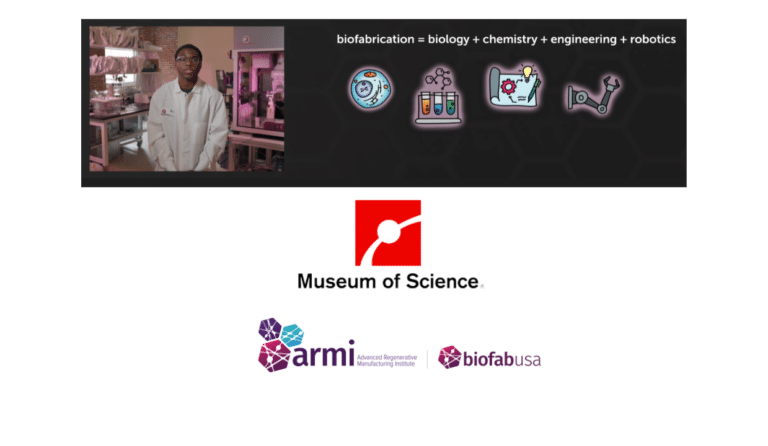Jobs in STEM are currently being created at twice the rate of non-STEM jobs according to the U.S. Bureau of Labor Statistics. These positions also pay up to 30 percent more across all educational levels.

CAST, a nonprofit organization headquartered in Wakefield, MA, believes learning should have no limits. Founded in 1984, by education researchers, CAST created the Universal Design for Learning (UDL) framework, a set of principles based on learning sciences including neuropsychology, human development, and education research. “UDL is one of our core levers for change to help make learning environments that are inclusive and help everyone reach their full potential,” said Sam Johnston, Director of Postsecondary and Workforce Development.
“CAST aims to support potential employees, particularly those students from backgrounds currently underrepresented in STEM, to discover and prepare for education and career pathways into industries like biofabrication. It’s here, at the leading edge of scientific and technical innovation, where the need for skilled labor will rapidly increase,” she continued.

CAST believes learning should have no limits, whether in school or in the workplace. The organization’s vision is for every learner to have engaging opportunities for career exploration and development and to access education and training environments designed with their needs in mind. CAST also equips workplaces with effective practices to see, recruit, and retain diverse talent so these well-prepared learners can become the workforce of the future.
“CAST is excited to join ARMI|BioFabUSA to work toward a mutual goal of inspiring and preparing young people to enter the technical workforce of tomorrow via the ARMI|BioFabUSA Education and Workforce Development (EWD) programs,” Johnston said.
Much of the CAST current research and development centers on connecting students with the growing opportunities STEM fields have to offer.
“We believe the principles of UDL can benefit learners both in and beyond K-12, including those in higher education and in the workforce,” Johnston said, adding, “We are designing and piloting digital tools for career exploration and documentation of prior learning for both students in Career & Technical Education (CTE) settings, as well as out-of-school youth enrolled in pre-apprenticeship programs like YouthBuild.”

As part of the EWD mission at ARMI|BioFabUSA, CAST has partnered with two New Hampshire CTE Schools – Nashua High School and Manchester School of Technology to connect a talent pool directly with the employers. “This is where students can explore career pathways and employers can share the exciting career opportunities in the emerging biofabrication industry,” explained Johnston, adding, “We have engaged with six students and a dozen employers to date and many of the CTE students have already elected to pursue careers in technical fields. Additionally, CTE programs often serve more diverse student populations, including higher rates of low-income students and individuals with disabilities – allowing us to further broaden our outreach to prospective job-seekers.”
“We believe the best way to increase awareness and engagement in biofabrication is to directly connect young people, the future workforce, with the emerging industry leaders in their own backyard,” noted Johnston.
“The career exploration tool we are developing includes scenarios designed to link the stages of biofabrication with real-world scenarios. One potential scenario introduces John, an entry-level STEM technician working as part of a team to design a 3D bioprinting process for ligaments. As the student progresses through the module, he learns about importance of this new technology, which allows patients to recover faster by having their own cells used to produce new ligaments and avoid additional surgeries. Finally, the module explains how advances in ligament and tendon bioprinting may bring scientists closer to 3D printing entire organs,” Johnston explained.

CAST is also co-designing a mobile app that allows users to explore biofabrication in a digital space. “Co-design means involving our end-users (students, teachers and employers) at the earliest phases of ‘ideation and planning’ so our product benefits from the insights and reflections of those it is made to serve. Together with high school CTE students, we’ve begun the design discovery process – engaging in brainstorming sessions, focus groups, and user interviews. With the aid of our student co-designers and subject matter expertise from ARMI|BioFabUSA members, we’ll be creating a prototype career exploration tool for delivery in 2020,” said Cara Wojcik, who leads the UX design of the prototype.
This first iteration of this prototype is designed for use by students, teachers, guidance counselors, and support staff in CTE settings. However, CAST is interested in exploring how the tools can be adapted to new audiences. “It’s exciting to think about how a career exploration tool could allow Veterans to discover opportunities that would build on their existing experiences,” she concluded.






